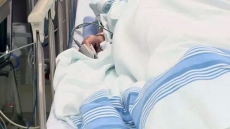CALGARY — A report by the railway company involved in this week's deadly derailment in the Rocky Mountains details how challenging it is to run trains in frigid temperatures.
"Harsh winter conditions are an inescapable reality in Canada's northern climate," says a document titled White Paper: Railroading in the Canadian Winter on Canadian Pacific Railway's website.
"Winter has a profound impact on a railway's operations and its ability to maintain service for its customers."
A Vancouver-bound train with 112 grain cars was parked with its air brakes engaged on a grade east of Field, B.C., when it started moving on its own around 1 a.m. Monday. The train sped up to well over the limit before 99 cars and two locomotives hurtled off the tracks. It was about -20 C at the time.
Engineer Andrew Dockrell, conductor Dylan Paradis and trainee Daniel Waldenberger-Bulmer died in the crash.
The white paper said cold increases air leakage from a train's air- brake system that results in varying air pressures between the head and tail end of a train.
"This is a major challenge."
Trains are shortened whentemperatures dip below -25 C to ensure pressure remains consistent throughout their entire length, the report said.
A union representative has said the derailed train was shorter than the 135 cars CP has run in recent years. But a veteran Boston-based engineer said 112 cars is large for a train of full grain hoppers.
"Our forefathers in the business would never have put a train together that big under those climatic conditions and expected it to run smoothly," said Joe Mulligan with Railroad Workers United, a volunteer-run group of rank-and-file railroaders across North America.
The Transportation Safety Board has said the train was parked for two hours before it began to move on its own. Handbrakes were not applied, the board said.
"It would have taken an awful lot of handbrakes to hold a train back that big," said Mulligan, who added there was nothing to be done once the train was in motion.
The Calgary-based railway said in the report that it also places locomotives at different points along a train in the winter. Distributing power that way makes it quicker to pressurize air brakes. The train that derailed had a locomotive at the front, middle and end.
In extreme cold, dryers are used to prevent moisture from getting into the brakes, which means it takes longer to pressurize them and do the required safety checks, said the winter railroading report.
"This unavoidably increases the train's terminal dwell time."
The white paper also said train speeds must be reduced in frigid temperatures — by at least 16 km/h below -25 C and by at least 32 km/h at -35 C.
Will Young, a locomotive mechanic based in Kansas City, Mo., and an organizer at Railroad Workers United, said cold weather takes a toll on many train components.
"Things break that normally don't. Steel just becomes brittle. Rubber seals just harden and don't work."
Young said he suspects some sort of mechanical issue caused the braking system to lose power. That could have set off the chain of events that led to the catastrophe.
"It only takes that ever-so-slight touch of momentum."




